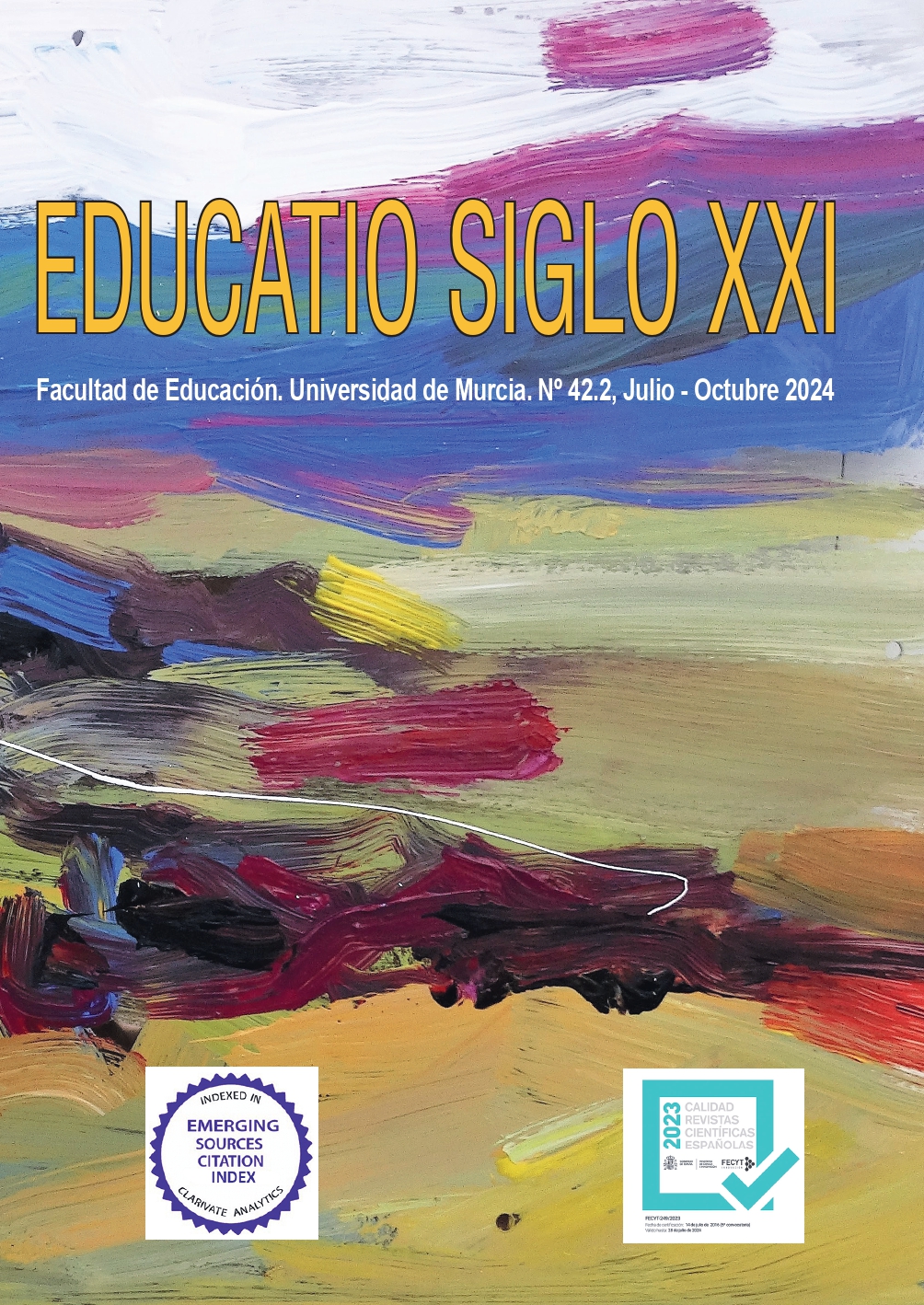Dieta digital en alumnado universitario: reflexiones tras un día de desconexión
Resumen
Las nuevas generaciones desarrollan sus vidas rodeadas de diferentes medios digitales, consumiendo y produciendo todo aquello que los algoritmos, cada vez más refinados, ponen a su alcance. En este contexto aparecen propuestas que buscan potenciar la perspectiva crítica de la ciudadanía, y que se empiezan a poner en práctica en iniciativas educativas formales que conciencian sobre el consumo y la dependencia digital. Este artículo busca analizar las reflexiones del alumnado ante una propuesta de «dieta digital» (24 horas de desconexión) integrada en una materia del Grado de Educación Social durante el curso 2021/2022. Para ello, se plantea una metodología cualitativa, que tiene como objetivo el analizar las posibilidades educativas de dicha propuesta para la concienciación sobre el uso de los medios digitales. Los resultados de este trabajo muestran como una parte importante del alumnado participante desiste del intento o muestra síntomas asociados a la adicción, al mismo tiempo, los/as protagonistas manifiestan la importancia que ejercen las TIC en los distintos ámbitos de su vida. Se destaca, finalmente, la necesidad de concienciar a la ciudadanía a través de propuestas como la analizada.
Descargas
-
Resumen529
-
PDF346
Citas
Bas-Peña, E. (2014). Educación social y formación en drogodependencias. Salud y drogas, 14(1), 71-83. https://www.redalyc.org/articulo.oa?id=83931686007
Buckingham, D. (2005). Educación en medios: alfabetización, aprendizaje y cultura contemporánea (1ªed.). Paidós Comunicación.
Carbonell, X. (2020). El diagnóstico de adicción a videojuegos en el DSM-5 y la CIE-11: Retos y oportunidades para clínicos. Papeles del Psicólogo, 41(3), 211-222. https://doi.org/10.23923/pap.psicol2020.2935
Castells, M. (2006). La era de la información: economía, sociedad y cultura (3ª ed.). Alianza.
Díaz, Ó., Santos, D., y Matellanes, M. (2021). La creatividad de la generación Z según su actividad en las redes sociales. Fonseca, Journal of Communication, (22), 231-253. https://doi.org/10.14201/fjc-v22-22703
Doval-Avendaño, M., Domínguez, S. y Dans, I. (2018). El uso ritual de las pantallas entre jóvenes universitarios/as. Una experiencia de dieta digital. Revista Prisma Social, (21), 480-499. https://revistaprismasocial.es/article/view/2323
Echeburúa, E. (2012). Factores de riesgo y factores de protección en la adicción a las nuevas tecnologías y redes sociales en jóvenes y adolescentes. Comunicaciones Breves, 37(4), 435-447. https://www.aesed.com/upload/files/vol-37/n-4/v37n4_5.pdf
Escaño, C. (2019). Sociedad postdigital (ontología de la remezcla). Iberoamérica Social: Revista-red de estudios sociales, 7(12), 51-53. https://dialnet.unirioja.es/servlet/articulo?codigo=6992796
Grajales, J. F. y Osorno, Y. M. (2019). La globalización y la importancia de las TIC en el desarrollo social. Revista Reflexiones y Saberes, (11), 2-9. http://34.231.144.216/index.php/RevistaRyS/article/view/1133/1527
Hernández, C., Iglesias, J. y Medina, E. (2016). Repercusiones del uso y abuso de internet en la identidad. PsicoEducativa: reflexiones y propuestas, 2(4), 31-35. https://n9.cl/89rk8
Hernández, R., Fernández, C. y Baptista, P. (2014). Metodología de la investigación (6ª ed.). McGraw-Hill.
Hernández-Ortega, J. y Rayón-Rumayor, L. (2021). Teléfonos móviles, redes sociales y praxis en adolescentes. Educatio Siglo XXI, 39(3), 135-156. https://doi.org/10.6018/educatio.427011
López, M., Tapia-Frade, A. y Ruiz, C. M. (2023). Patologías y dependencias que provocan las Redes Sociales en los jóvenes nativos digitales. Revista de Comunicación y Salud, 13, 1-22. http://doi.org/10.35669/rcys.2023.13.e301
López, N. y Gómez, L. (2021). Tendencias de cambio en el comportamiento juvenil ante los media: Millennials vs Generación Z. Estudios sobre el Mensaje Periodístico, 27(2), 543-552. https://doi.org/10.5209/esmp.70170
Martín, D. y Medina, M. (2021). Redes sociales y la adicción al like de la generación z. Revista de Comunicación y Salud, 11, 55-76. https://doi.org/10.35669/rcys.2021.11.e281
Miles, M. B., Huberman, A. M. y Saldaña, J. (2020). Qualitative data analysis: a methods sourcebook (4ª ed.). SAGE.
Pinargote-Baque, K. Y. y Cevallos-Cedeño, A. M. (2020). El uso y el abuso de las nuevas tecnologías en el área educativa. Dominio de las Ciencias, 6(3), 517-532. https://dialnet.unirioja.es/servlet/articulo?codigo=7539716
Serrano-Puche, J. (2014). Hacia una “comunicación lenta”: el hábito de la desconexión digital periódica como elemento de alfabetización mediática. Trípodos, 1(34), 201-214. https://n9.cl/sjv1
Tójar, J. C. (2006). Investigación cualitativa: comprender y actuar. La Muralla.
Varguillas, C. (2006). El uso de atlas.Ti y la creatividad del investigador en el análisis cualitativo de contenido. Laurus, 12, 73-87. https://www.redalyc.org/articulo.oa?id=76109905
Derechos de autor 2024 Servicio de Publicaciones de la Universidad de Murcia

Esta obra está bajo una licencia internacional Creative Commons Atribución-NoComercial-SinDerivadas 4.0.
Las obras que se publican en esta revista están sujetas a los siguientes términos:
1. El Servicio de Publicaciones de la Universidad de Murcia (la editorial) conserva los derechos patrimoniales (copyright) de las obras publicadas, y favorece y permite la reutilización de las mismas bajo la licencia de uso indicada en el punto 2.
2. Las obras se publican en la edición electrónica de la revista bajo una licencia Creative Commons Reconocimiento-NoComercial-SinObraDerivada 4.0 Internacional (texto legal). Se pueden copiar, usar, difundir, transmitir y exponer públicamente, siempre que: i) se cite la autoría y la fuente original de su publicación (revista, editorial y URL de la obra); ii) no se usen para fines comerciales; iii) se mencione la existencia y especificaciones de esta licencia de uso.
3. Condiciones de auto-archivo. Se permite y se anima a los autores a difundir electrónicamente las versiones pre-print (versión antes de ser evaluada) y/o post-print (versión evaluada y aceptada para su publicación) de sus obras antes de su publicación, ya que favorece su circulación y difusión más temprana y con ello un posible aumento en su citación y alcance entre la comunidad académica. Color RoMEO: verde.










